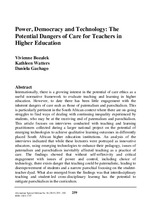Power, democracy and technology: the potential dangers of care for teachers in higher education

View/
Date
2015Author
Bozalek, Vivienne
Watters, Kathy
Gachago, Daniela
Metadata
Show full item recordAbstract
Internationally, there is a growing interest in the potential of care ethics as a
useful normative framework to evaluate teaching and learning in higher
education. However, to date there has been little engagement with the
inherent dangers of care such as those of paternalism and parochialism. This
is particularly pertinent in the South African context where there are on-going
struggles to find ways of dealing with continuing inequality experienced by
students, who may be at the receiving end of paternalism and parochialism.
This article focuses on interviews conducted with teaching and learning
practitioners collected during a larger national project on the potential of
emerging technologies to achieve qualitative learning outcomes in differently
placed South African higher education institutions. An analysis of the
interviews indicated that while these lecturers were portrayed as innovative
educators, using emerging technologies to enhance their pedagogy, issues of
paternalism and parochialism inevitably affected teaching as a practice of
care. The findings showed that without self-reflexivity and critical
engagement with issues of power and control, including choice of
technology, there exists danger that teaching could be paternalistic, leading to
disempowerment of students and a narrow parochial focusing on the studentteacher
dyad. What also emerged from the findings was that interdisciplinary
teaching and student-led cross-disciplinary learnng has the potential to
mitigate parochialism in the curriculum.
